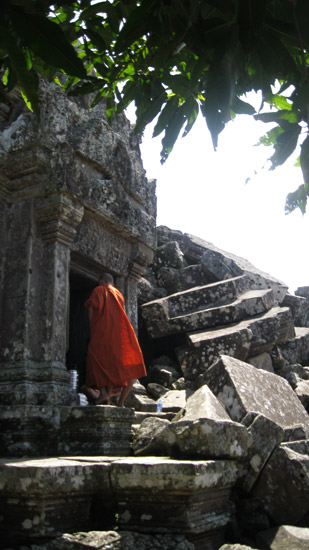
A Buddhist monk at Preah Vihear. Photo by the author
October 12, 2011
Posted by Susan Spano
Smithsonian.com
Andrea and Brandon Ross fell in love with Southeast Asia on their very first visit, then moved to Cambodia in 2003 to start Journeys Within, a travel agency headquartered in Siem Reap at the threshold of Angkor.
They were pioneers at the time. In the aftermath of the Khmer Rouge genocide and civil war that claimed the lives of at least two million people between 1975 and 1998, the town was a run-down backwater. But the young American couple knew it wouldn’t stay that way. Now Siem Reap has a population of about 100,000, an international airport, a branch of the national museum and ritzy hotels catering to millions of people who visit Cambodia every year to see the 150-square-mile archaeological park at Angkor, a UNESCO World Heritage Site enshrining the singular art and architecture of the Khmer Empire.
Last fall I wanted to go to Cambodia, but not on my own. For this visit I wanted expert help because my goal was to visit not just Angkor, but off-the-beaten track Khmer temples in the back of beyond, such as Preah Vihear on the contested border between Cambodia and Thailand. By chance, I found the Rosses who tailored a trip for me, starting in Angkor, where I saw all the great Khmer Empire landmarks, from majestic Angkor Wat to jungly Ta Prohm. At Bayon it started to pour, sending tears streaming down the strange smiling faces that line the sides of the temple’s iconic beehive-shaped towers.
From there my guide and I took a van over rough, single-lane roads to Koh Ker, a Khmer royal city about 60 miles northeast of Angkor famous for its 7-story pyramid. Mines laid during the civil war left it largely unexcavated and seldom visited. But efforts to dismantle leftover ordnance has begun to pay off, allowing for the opening of Koh Ker to sightseers.
Then it was on the Preah Vihear, the highlight of the trip, another Khmer temple built around the time French stonemasons were at work on Chartres. The complex is clustered around a 2,600-foot walkway that leads to the edge of a cliff in the Dangrek Mountains. It‘s magnificent, but woefully neglected chiefly because of on-and-off border skirmishes between Thai and Cambodian troops in the area.
The tour company was able to stage my visit to Preah Vihear during a cease fire because it knows Cambodia at first hand. The Rosses are personally invested in it.
While living and working there, Brandon and Andrea realized how little money it takes to do good things in Cambodia where the average income is under $800 a year. For instance, $350 can give villagers a much-needed well. So along with the travel agency and a bed and breakfast inn, they founded a U.S.-registered nonprofit organization that now has an annual budget of $180,000, partly funded by clients. In addition to building wells, Journeys Within Our Community underwrites university scholarships, free language classes and micro-loans for small, start-up businesses. “Give and Take” tours allow volunteer-travelers to spend time working on community development projects.
The impulse to give back—a fundamental of responsible tourism—came naturally to the Rosses in Cambodia. And there are other small travel agencies operating in Asia that take the same approach. Myths and Mountains, based in Nevada, showed me Nepal a few years ago, including one of the 55 libraries nurtured by the company in rural villages. Like my visit to Cambodia, it was a rich trip because the tour company has deep roots in the region.

No comments:
Post a Comment